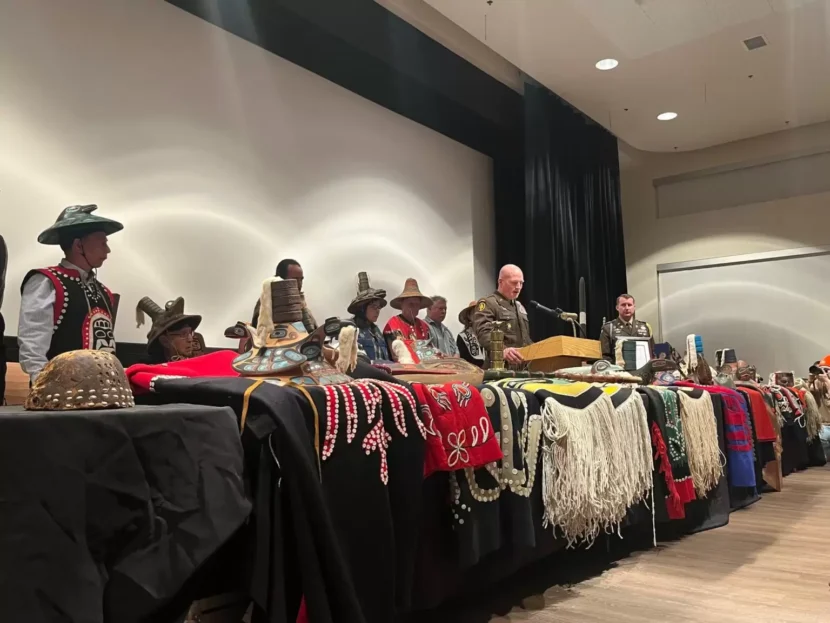
A large group of people greeted each other with morning chatter at the end of a Wrangell peninsula on Saturday, where the Taalkweidí clan once resided.
They were there to witness the U.S. Army apologize to the Wrangell Cooperative Association for bombarding the Tlingit village of Ḵaachx̱aana.áakʼw in 1869. The tribe lost at least five people, a totem pole and multiple houses. And for the past 155 years, the tribe has been waiting for this apology.
This was one of several different stops on Saturday’s walk to where Tlingit clans once lived. The last was where a Tlingit man, Shx’atoo, was hanged at Fort Wrangel. Before he turned himself in to stop the bombardment, he stopped at each clan’s location to say goodbye. The group retraced his last steps on this walk.
After visiting Taalkweidí and honoring the clan through a small ceremony, footsteps and chatter took over the walk towards the second stop, where the Teeyhíttaan clan lived.
“When he stopped here, he talked to the clan leader, whose name I now bear, Gashx,” Teeyhíttaan clan leader Aak’wtaatseen Mike Hoyt said. “He brought his hat out and he brought out other at.óow to stand before. That’s how I’m feeling today, that we would bring these things out for him if he were here, and that his spirit is here.”
At.óow are significant tribal artifacts.
Continuing the walk
Fifteen-year-old Vincent Cordova from Ketchikan was holding a peace pipe on the walk. It’s one of the recently repatriated at.óow. It features the Gunakadeit, a sea monster in Tlingit culture.
“I got told to hold the pipe because I am the clan leader’s oldest nephew,” Cordova said. “I’m proud of this and I’m happy to hold such an artifact.”
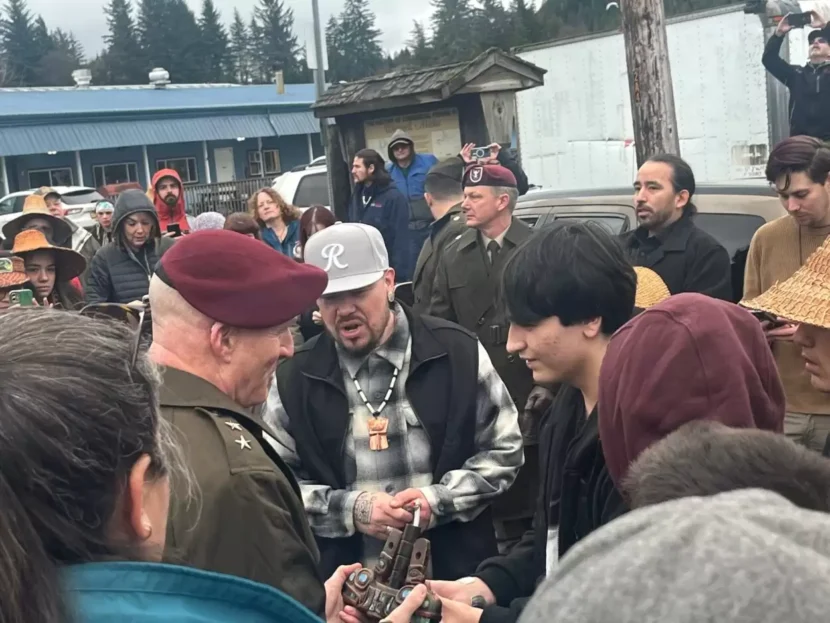
After a few more stops, the group ended up in front of Shakes Island, where the Naanyaa.aayí clan lived. Clan leader Gaalgé Kevin Calahan said there were six houses on Shakes Island.
“I have my nephew, Vince. This is a Naanyaa.aayí pipe that belonged to Chief shakes,” Calahan said. “We bring it out when we do our smoke ceremonies. I thought it would be appropriate if the General will hold it, we won’t smoke out of it, but I’ll light it.”
“The body remembers the wrongs that were done to my ancestors.”
The group visited Kiks.ádi territory and then headed towards Fort Wrangel, which is now the post office. Wrangellite Heidi Armstrong said her parents lived for this day.
“As a native child, I’m half native,” she said. “You know the wrongs that were done weren’t necessarily done to me, but the body remembers the wrongs that were done to my ancestors.”
She said there’s a picture from the 1940s in the Wrangell Museum that shows a similar walk along Front Street after they raised Chief Shakes house.
“It’s a historic walk,” Armstrong said. “I’ve always looked at that and thought, man, I wish I was part of that. Sorry. I’m getting choked up. I never dreamt that I’d be part of such a huge, I don’t know, maybe huge is the wrong word, but such a meaningful time.”
When the group reached the last stop, at the old Fort Wrangel, clan leader Hoyt said this is where the altercation happened. Where the U.S. Army launched bombs into the village. Where Shx’atoo turned himself in. Where he was hanged.
“I want you to imagine thinking back to where we started,” Hoyt said. “If you look that direction, you can see the trees. You can see the point. I want you to imagine paddling across and turning himself in over here.”
Hoyt said before Shx’atoo walked to the gallows to face his fate, he sang a song. He played the only recording, sung by William Tannery in the 1950s. Tannery was the primary storyteller who was key to passing the bombardment story to future generations.
It sounded lonely, just his voice.
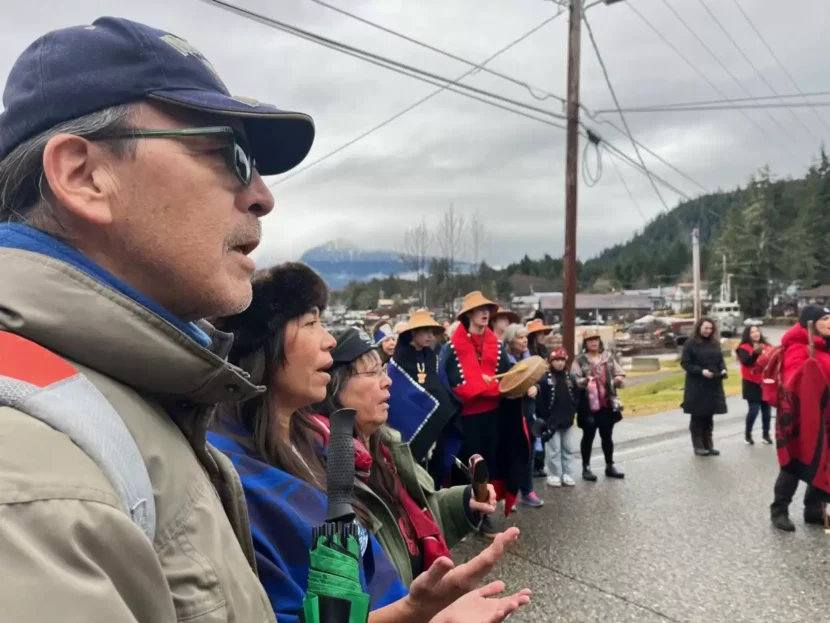
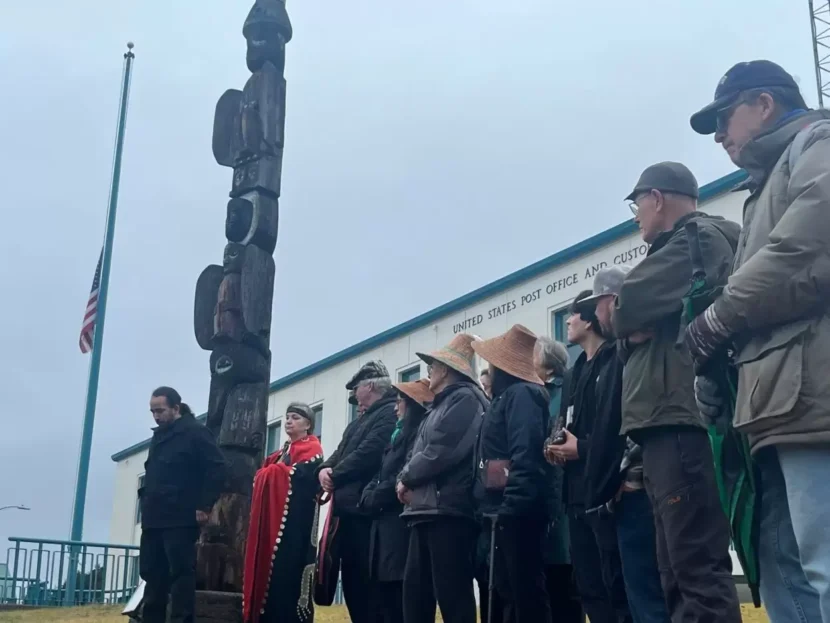
“This does not look like a conquered people to me.”
The group then walked to the Nolan Center, Wrangell’s civic center. Inside, there was a significant amount of historical at.óow in the front of the large room.
“It’s often said that we are a conquered people. This does not look like a conquered people to me,” Hoyt said. “This looks like a statement of who we are, a statement that goes back hundreds of years, thousands of years, and a statement that will continue to go forward accordingly.”
U.S. Army Major General Joseph Hilbert waited at the door to request permission to be on the tribe’s territory.
“Good afternoon. I’m Major General Joe Hilbert from the Commanding General 11th Airborne Division in the United States Army Alaska,” he said. “I live and work on the land of the Tlingit people. I request permission to enter the land the Shtaxʼhéen Ḵwáan.”
After accepting the request, the tribe sang a welcome song with a drum beat that filled the room.
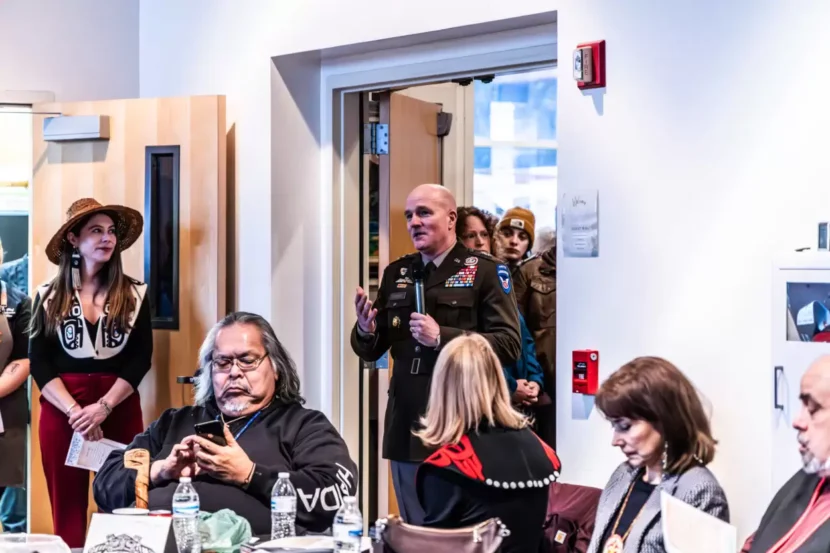
All of the clan leaders spoke in response to the Major General’s request, including Gaalgé Kevin Calahan with the Naanyaa.aayí clan.
“There really wasn’t a handbook out on how this happens,” Calahan said. “We’ve done plenty of Koo.éex’, plenty of feasts, we’re preparing to raise poles. This was a new thing. This is a great thing, but it was still brand new in new territory.”
He said the songs that they sing mean something big is happening.
“Some of the most beautiful songs are cry songs”
The tribe then sang a cry song, with a slow drum beat in the background.
“Some of the most beautiful songs are cry songs, but they’re songs you don’t hear because they’re so heavy,” Calahan said. “They serve a purpose.”
Some keynote speakers took turns speaking about how this event was historical, including U.S. Senator Lisa Murkowski.
“In order for us to move forward, the wrongs have to be addressed,” she said. “They have to be acknowledged, and we need that apology for us to move forward and to heal.”
She said the solemnity that the military presents is not casual and she hopes it’s recognized. She also honored the veterans in attendance.
“I’m grateful to those who have served,” Murkowski said. “Our treasured veterans, you have not always been treated with the dignity and the respect that should be afforded you.”
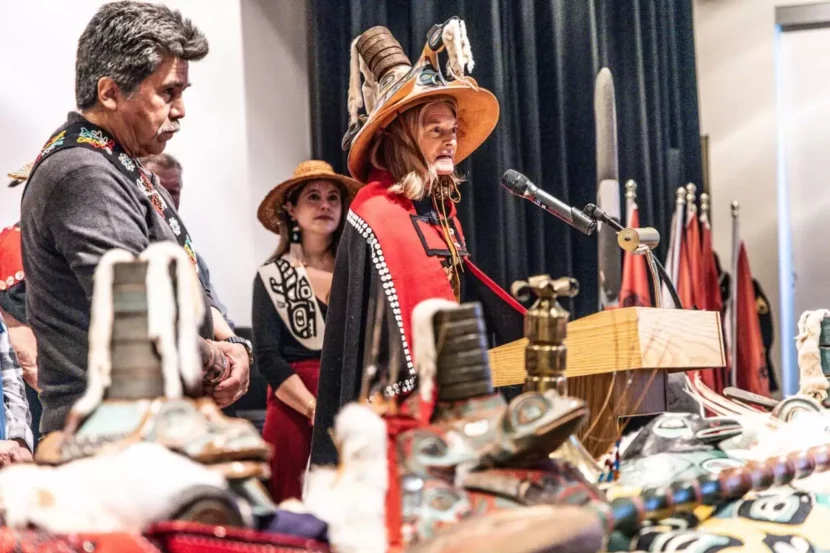
Later in the day, Major General Joseph Hilbert officially apologized to the clans. He assured everyone that the apology was written by human beings with hearts, even though it might sound formal.
“It is incredibly a heartfelt apology on behalf of the Department of the Army to acknowledge the 1869 bombardment of the Tlingit village of Ḵaachx̱aana.áakʼw by the United States Army,” he said. “And to offer an apology to the Tlingit people on behalf of the United States Army.”
He acknowledged that the U.S. Army’s bombardment on Ḵaachx̱aana.áakʼw resulted in death, suffering and generational trauma on the Tlingit people.
“I hope that today represents not an end, but a beginning,” Hilbert said. “A beginning of healing and a relationship between us going forward.”
Not every clan accepted the apology. The Taalk̲weidí, Khaach.ádi, Kayaashkeiditaan and Sik’nax̲.ádi accepted.
Three clans did not accept the apology
Aak’wtaatseen Mike Hoyt, with the Teeyhíttaan, did not. He said making peace is about rebuilding and restoring a relationship.
“I have heard your apology and I show as much respect as I can,” he said. “I really appreciate the words that you said in there that this is not the end, but a beginning, and to that extent, we can’t fully accept the apology so much as we see this as the beginning.”
Gaalgé Kevin Calahan who leads the Naanyaa.aayí clan said talking to others has deepened his understanding of the bombardment.
“I know it’s easy to sit back and think, ‘well, that happened so long ago, it didn’t affect you,’” he said. “I was like, ‘well, we’ve been asking about it every year since then.’ It affects us. It’s never left. You think about it every December.
Major General Hilbert said there needs to be continued communication to further establish the relationship between the Army and the Tlingit clans.
“I think where I was very much encouraged was it was an acknowledgement, and not a rejection, and a demonstration of a relationship going forward,” he said.
The other clans that did not accept the U.S. Army’s apology were the Kiks’adi and Naanyaa.aayí. In total, four clans accepted and three did not.